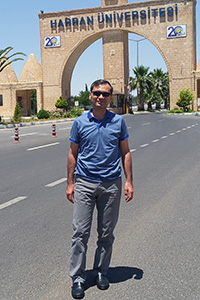 Ahmet Sait Yayla ('01 M.S. '05 Ph.D.), former chief of police for the Turkish National Police Department, helps law enforcement agencies around the world understand how some of the most prolific terrorist organizations use the web and social media to attract new young recruits.
Ahmet Sait Yayla ('01 M.S. '05 Ph.D.), former chief of police for the Turkish National Police Department, helps law enforcement agencies around the world understand how some of the most prolific terrorist organizations use the web and social media to attract new young recruits.
In 2014, Yayla left behind his law enforcement career to accept a position as professor and chair of the Department of Sociology at Harran University in Turkey, where he researches the propaganda that terrorist networks such as the Islamic State of Iraq and Syria (ISIS), Al-Qaeda and Hezbollah use to recruit youth. He hopes his research will aid law enforcement agencies in finding new ways to combat the spread of radicalism and end the recruitment cycle of such terrorist groups.
"The apparent and claimed accomplishments of ISIS in some regions have been publicized cleverly over the Internet and widely shared on Facebook, Twitter and other social media platforms like Skype, Ask.fm, Instagram, Tumblr and Kik," Yayla says. "There is a need for extensive research on understanding how youth are being affected by this propaganda, resulting in their interest in joining a cause."
Yayla, who earned a master's degree in criminal justice and a doctorate in information science from UNT, is among alumni using their degrees in cybersecurity fields to fight today's most sophisticated cybercriminals and terrorists.
UNT's criminal justice program is at the forefront of arming students with real-world experience to conduct research and work in law enforcement fields, says Eric Fritsch, chair and professor of criminal justice. When the University of North Texas New College at Frisco opens in January 2016, it will expand on UNT's program and include a new Digital Forensics and Cyber Threat Assessment Laboratory, he says.
Find more about cybersecurity
- Read a feature story about UNT alumni involved with cybersecurity
- Read more about the Center for Information and Computer Security
- Read more about Cybersecurity Tips
"UNT's criminal justice program has always been a leader in producing highly skilled graduates but this new lab will give students a real-world laboratory environment to practice and build their skills, as well as provide training to criminal justice and other agency practitioners who work in the area of digital forensics," he says.
Laying the groundwork
The thousands of young females and males being recruited every day from the U.S. and Europe to actively fight for ISIS and other terrorist groups is a growing epidemic mostly because of the propaganda that terrorist groups spread in the digital world, Yayla says.
"Terrorist groups attract and allure youth from Western and Muslim countries because their propaganda targets their emotions and makes terrorist activities such as fighting and using guns seem exciting just like in the video games they play," he says.
Yayla's path to becoming one of today's most sought-after policy experts on cybersecurity, border security and terrorism is in part thanks to his time as an international student at UNT, he says. In 1999, while serving as police captain for the Counter-terrorism and Operations Division of the Ankara Police Department, he received a Turkish Government Scholarship to study at UNT's Turkish Institute for Police Studies, which at the time brought mid-level managers of the Turkish National Police to the United States to earn master's and doctoral degrees. The program was headed by Robert Taylor, the former chair of UNT's Department of Criminal Justice, and exposed students to the American justice system in hopes of helping them create equitable justice systems in their native countries, Yayla says.
"This was a unique opportunity. I was already in law enforcement at the time and I chose UNT's criminal justice program because it was directly related to my experiences and background," he says. "Dr. Taylor and the UNT-International office made my time at UNT memorable. I learned about different cultures and laws in the U.S."
Tracking terrorists
After completing his doctorate in 2005, Yayla returned to Turkey and his police work. In addition to leading criminal investigations involving crimes such as murder, extortion, theft and burglary, Yayla says he headed operations to track radical terrorist networks such as ISIS, Al-Qaeda, Al-Nusra, Hezbollah and the Kurdistan Workers' Party. That year, he became founding director of the Ankara Cyberterrorism and Information Systems Laboratory, the largest laboratory of its kind in Turkey focused on terrorism investigations, including computer forensics and cyber threats coming from terrorist groups.
"I have carried out several operations against these terrorist organizations," says Yayla.
Because of his UNT education and field experience, he says he was well-prepared when he became chief of police for the Turkish National Police Counter-terrorism and Operations Department in 2010 and the department's chief of public order and crime prevention two years later. The roles entailed protecting 2 million people living in the Turkish province of Sanliurfa and managing more than 1,000 police officers along the southern border of Turkey near Syria.
As a scholar, author and researcher today, Yayla says he's gained important field experience and intelligence on terrorist networks to assist law enforcement and government agencies around the world in combating terrorism. He's served as a witness before the U.S. Congress and Senate Homeland Security Committee and Subcommittee on countering terrorist attacks and as an advisor for the U.S. Department of Homeland Security in Ohio.
He credits UNT faculty mentors, including Fritsch, Taylor and Brian O'Connor, professor of library and information sciences, for helping equip him with the skills and knowledge needed to advance his career.
"When you go to a different country, there are several barriers, including the language and culture," Yayla says. "My time at UNT was valuable in helping me overcome these barriers in the U.S and to help others around the world."


